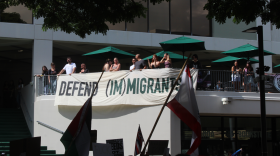Tomorrow is a Hawaiian national holiday honoring the return of sovereignty to the Hawaiian Kingdom in 1843. Restoration Day festivitieswere held across the islands over the weekend. Statewide celebrations continue to raise awareness about Hawai?i’s history….and for some educators, it also raises questions. HPR Reporter Ku?uwehi Hiraishi has this story.
Every public high schooler in Hawai?i is required to take a semester of Modern Hawaiian History. The course typically covers what happend following the overthrow of the Hawaiian Kingdom, beginning with American annexation in 1898 – an event this scholar says never happened.
“So when I may first say that, people will be shocked,” says Dr. Keanu Sai, a political science professor at the University of Hawai?i.
Dr. Sai completed his doctoral dissertation in 2011. In it, he argues Hawai?i is illegally occupied by the United States.
“But if you see that there is no treaty of annexation but rather a joint resolution of annexation. Then you go, ?Oh, I didn’t know that.?” says Dr. Sai, “So a lot of our apprehension is because we didn’t know. That’s all it really is.”
The premise is that under international law a treaty of annexation is needed to transfer Hawai?i to the United States. Dr. Sai found no such treaty. Asked how this history has taken more than a century to come to light, he says....
“Our people in Hawai?i have gone through denationalization, which by definition is the obliteration of the national consciousness of a country,” says Dr. Sai.
Dr. Sai has spent the last seven years doing rounds of classroom and community lectures on his research. He recently held a training workshop for teachers.
“I don?t remember anybody telling me we were occupied,” says Kahuku Intermediate School teacher Kauwila Sheldon.
She says the research was a far cry from what she grew up learning. Asked whether she’ll be sharing this with her students?
“Of course, of course. I would love to bring this to my students to teach them the truth,” says Sheldon.
The idea of a prolonged U.S. occupation is nothing new to Kamehameha Kapalama Elementary School teacher Bruce Ka?imi Watson.
“I guess I already woke and I enjoy being woke and I raised woke children,” says Watson.
He already teaches students about kingdom holidays and Hawaiian patriotism. But discussing Hawai?i within this “occupation” framework challenges him to completely revamp his approach.
“I did not realize the political import of such words until today, like truly understand,” says Watson. “Just the clarification of the wording cause words are important. Because words have meaning. Indigenous vs. aboriginal. Ceded lands vs. seized lands. Denationalization or assimiliation.”
Last summer, Dr .Sai’s research got the attention of the National Education Association or NEA, who acknowledge Hawai’i’s history of prolonged illegal occupation at their annual gathering. Back at the workshop, Dr. Sai emphasized that teachers not politicize the discourse but instead use primary historical documents to let students critically think about history. But Watson says…
“Education and providing education is activism regardless of how you do it,” says Watson.




